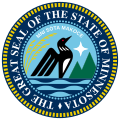November 3, 2026 | |||||||||||||||||||||||||
All 67 seats in the Minnesota Senate 34 seats needed for a majority | |||||||||||||||||||||||||
|---|---|---|---|---|---|---|---|---|---|---|---|---|---|---|---|---|---|---|---|---|---|---|---|---|---|
| |||||||||||||||||||||||||
 Map of the incumbents: DFL incumbent DFL incumbent retiring Republican incumbent Republican incumbent retiring | |||||||||||||||||||||||||
| |||||||||||||||||||||||||
| Elections in Minnesota |
|---|
 |
The 2026 Minnesota Senate election will take place on November 3, 2026. All 67 districts in the Minnesota Senate will be up for election to a four-year term. Primary elections will be held on August 11, 2026. [1] Currently, 34 seats are held by DFLers and 33 seats are held by Republicans.
Contents
The election will coincide with the election of the State House of Representatives as well as various federal, state, and local elections.

